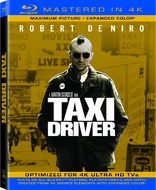Taxi Driver Blu-ray Movie
HomeTaxi Driver Blu-ray Movie 
Mastered in 4K / Blu-ray + UV Digital CopySony Pictures | 1976 | 114 min | Rated R | May 14, 2013
Movie rating
8.8 | / 10 |
Blu-ray rating
| Users | 3.9 | |
| Reviewer | 4.0 | |
| Overall | 3.9 |
Overview
Taxi Driver (1976)
A mentally unstable veteran works as a nighttime taxi driver in New York City, where the perceived decadence and sleaze fuels his urge for violent action.
Starring: Robert De Niro, Jodie Foster, Albert Brooks, Harvey Keitel, Leonard HarrisDirector: Martin Scorsese
| Drama | 100% |
| Crime | 59% |
| Psychological thriller | 37% |
| Thriller | 15% |
Specifications
Video
Video codec: MPEG-4 AVC
Video resolution: 1080p
Aspect ratio: 1.85:1
Original aspect ratio: 1.85:1
Audio
English: DTS-HD Master Audio 5.1 (48kHz, 16-bit)
French: DTS-HD Master Audio 5.1 (48kHz, 16-bit)
Subtitles
English, English SDH, French, Spanish
Discs
50GB Blu-ray Disc
Single disc (1 BD)
UV digital copy
Packaging
Slipcover in original pressing
Playback
Region A (B, C untested)
Review
Rating summary
| Movie | 5.0 | |
| Video | 5.0 | |
| Audio | 5.0 | |
| Extras | 0.0 | |
| Overall | 4.0 |
Taxi Driver Blu-ray Movie Review
Is it any better than the last release?
Reviewed by Martin Liebman June 3, 2013Then suddenly, there is a change.
Taxi Driver is one of the most ambiguous pictures of them all, and the ambiguity begins with the title. Who is a "taxi driver?" A "taxi
driver," or at least the title implies and the profession dictates, is a person who knows how to get somewhere, is capable of delivering others to a
destination of their choosing,
but who himself never actually goes anywhere. His is a journey of circles, of a continuous string of coming and going, but never really arriving
anywhere. He never finds a place to settle or stop; the destination is but another leg of the endless circle of seeing others to their homes or places
of business or recreation, but for the cab driver the symbolism of only delivering rather than arriving is impossible to miss. "Taxi driver" is also highly
impersonal; it denotes not only a profession but an invisible, forgettable figure, one that plays an important role but who vanishes without a
thought, for some as soon as the cab ride ends, for others he remains an empty vessel behind a wheel even during the ride. Now, imagine a "taxi
driver" who takes this existence outside of the cab and into every facet of his life. He sees a world around him that's always on the march, always
headed somewhere, and whether he likes the direction or destination or not is irrelevant. It's not his choice; he's only along for the ride, going
where others tell him, powerless to stop it -- unless he chooses to break the rules of the game. Taxi Driver is a masterpiece motion picture
that focuses like a laser on a life and a world both out of focus; it's a picture where nothing works as it should, at least in the mind of the "taxi
driver." He's in search of a place in the world, a role to play, but he comes to understand that his life, like his profession, is an unending circle of
nothingness that passes him by without so much as a blink of an eye. He sees opportunities to better himself and the world around him, both of
which lead to dire, unwanted consequences. Is the world what a man makes of it, or does the world make a man?
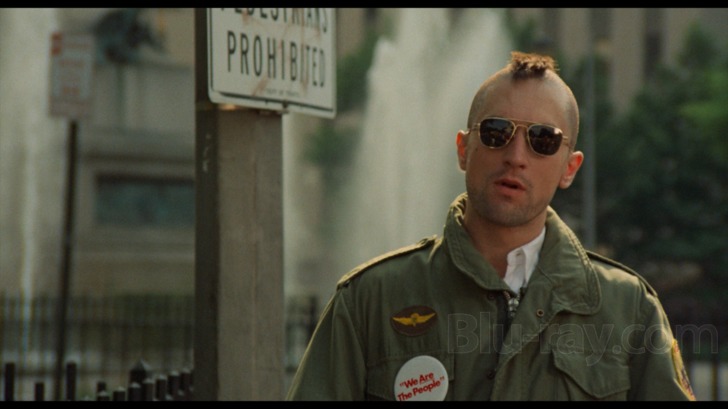
We are the Mastered in 4K.
Travis Bickle (Robert De Niro, Ronin) is a 26 year-old former Marine, an honorably discharged Vietnam veteran. He's a chronic insomniac who lands a job driving a cab around New York City at all hours of the night, soul searching as he drives, looking for his place in a world he sees in dire need of cleansing, meaning a clearing out of various individuals, attitudes, and ways of life he deems undesirable. Still, Travis seems like a gentle enough man, troubled yes but only wanting something better for his life. He one day catches a glimpse of a woman in white, giving her the appearance of an angel. She's Betsy (Cybill Shepherd), a campaign worker dedicated to the election of Presidential candidate Charles Palantine (Leonard Harris). Bickle finds the courage to ask her out through the guise of volunteering his time at the campaign office. The relationship goes well, but when Bickle's choice of date activities pushes Betsy away, he experiences a sudden change, becoming more hostile and developing a grudge against Palantine. Meanwhile, he meets a young prostitute of 12 years of age, Iris (Jodie Foster, The Silence of the Lambs), whom he develops almost paternal feelings for and seeks to free her from her go-nowhere lifestyle and the figurative chains of her pimp, "Sport" (Harvey Keitel, Reservoir Dogs).
For such an iconic picture -- and Taxi Driver is one of the few truly great films of them all and perhaps the definitive picture of the gritty big city films of the 1970s -- there are precious few certainties to be found in it. Taxi Driver is a picture open to multiple interpretations with no right or wrong answer; the absence of a definitive purpose, theme, or emotion is, in fact, the film's greatest strength. Director Martin Scorsese (Shutter Island) has built a picture centered not around a plot but a mind, a mind that sees the urban landscape of 1970s New York City from the perspective of a wayward former Marine who slowly unravels as the world around him spins him loose like a ball of yarn -- or is it he who through his own actions unspools the world? One possible theme of Taxi Driver centers on man's place in the world; does the world reject him, or does he reject the world? Does one influence or bring about the other? What is the trigger? Is it a series of events or a singularity? Taxi Driver is a therapist's dream film. The picture is but a snapshot of a larger whole that the audience never knows; much may be deduced from what's here, but not to any degree of satisfactory assurance of what makes Travis Bickle the man he becomes by film's end. His is a transformation from an obviously troubled but seemingly amicable individual only in search of himself and his role in the world to an individual unafraid to dole out justice based on his own evolving values and world view. Of course, whether Travis sees the bigger picture -- for his life, the lives of those around him, and that of the greater whole -- is another of the film's mysteries, but one of the few certainties of Taxi Driver is that it is an intoxicating and infinitely re-watchable slice of psychological cinema the likes of which has not since been duplicated and that offers new emotional and mind-churning undercurrents with every viewing.
Martin Scorsese reinforces the film's thematic ambiguity and emotional unbalance with what amounts to a visual seesaw that gives the movie a unique contrast that offsets right and wrong, certain and uncertain, and normal and abnormal -- but does so in a way that does not necessarily champion, or even really define, any of the above. Travis's world finds trouble by day and solidarity by night, and vice versa; the city that never sleeps never settles for anything but absolute chaos, at least as it is seen through Travis's eyes. Neither day nor night -- the contrast between light and dark and taken to greater metaphorical levels, right and wrong -- offer reprieve from Travis's worldview; that he is an insomniac, unable to differentiate between light and dark or settle into the routine of the world, only reinforces the notion that in Taxi Driver the only thing that can be certain is the film's and its characters's uncertainties. It's that imbalance that gives the movie its character; even the opening title sequence is framed by Bernard Herrmann's score that plays harshly and without much in the way of structure and certainty, and gives way on a whim to light, breezy, and amicable Jazz-like notes that immediately transform the general feel from hard and distant to smooth and inviting. Such is the case throughout the entire picture. Of course, there's Travis's own transformation, from a troubled and topsy-turvy but likable soul into a beast of a man who picks up a gun, rebels against the norm by shaving his head to a mohawk, and sets out to do as he does in his cab, deliver people to and from their destinations, only here the destinations are chosen by Travis and the means of achieving the goal is accomplished with the pull of the trigger rather than the turning of the wheel. Taxi Driver is the textbook case film for competently unbalanced and deliberately wayward filmmaking; Martin Scorsese's masterpiece thrives on the absence of certainty, and maybe even Travis Bickle himself could not pinpoint exactly what it is that defined his life as it is portrayed in the film.
Of course, it takes a special kind of talent and a special kind of understanding of this sort of material to be able to not only give life to a character such as Travis Bickle, but do so in convincing fashion. Robert De Niro turns in what may be his absolute finest performance, managing to give an off-kilter character in a completely unbalanced film a positive grounding while displaying a firm understanding of what Scorsese and Writer Paul Schrader seem to be trying to accomplish with the film, which is to create a disembodied soul trying to exist in a world he sees as being irrevocably out-of-control. De Niro's turn as Travis Bickle is positively haunting; he manages to give shape to the character without ever really providing him a soul, to breathe life into a character that otherwise appears dead or soon-to-be-dead to the world he, in turn, views as being shapeless and on the brink of destruction. Even considering his iconic pedigree and instantly-recognizable looks, De Niro completely dissolves into the part; his narration becomes the voice of the film as much as his face becomes its icon. Every set, prop, and costume become the character as De Niro puts them into play; the seamlessness with which he both monologues and dialogues is impeccable, and again that contrast between the outer Bickle and the man that lives inside is given a harmonious imbalance that De Niro plays perfectly and that, with similar elements, helps to shape an otherwise deliberately shapeless picture. De Niro is flanked by a pair of leading ladies who receive second billing but do not deliver second-level performances; Cybill Shepherd and Jodie Foster are fantastic as two of the driving forces behind Bickle's actions and the primary objects of his attention. Foster's part, in particular, is as challenging both on paper and in the flesh as De Niro's; the then-young actress handles the difficult part of a child prostitute with an unflinching honesty and realism that may be her finest performance, too.
Taxi Driver Blu-ray Movie, Video Quality 
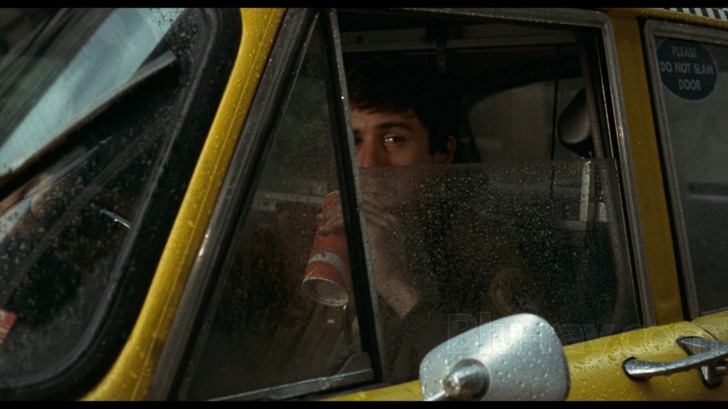
Sony's commitment to releasing the finest Blu-ray products is evident with every spin of a Sony-branded disc. The consistency of product -- from the
latest blockbusters to the most cherished classic titles from years gone by -- is arguably tops in the entire industry, and why shouldn't it be; Sony
was a lead Blu-ray design and advocacy outfit, its PlayStation 3 console offered disc playback and instant wide format adoption, and the first wave of
titles released back in 2006 bore the
Sony label on the spine. Since then, and through a few growing pains and spurts -- a bloody format war, a misstep or two, the transition from Dolby TrueHD to DTS-HD Master Audio -- the
studio has emerged as the most trustworthy in the industry when it comes to its Blu-ray product. When it says Sony, chances are extremely
high that the movie is going to look
(and sound) about as good as the format allows. Now, Sony is recalling the days of its "Superbit" DVD releases with the emergence of "Mastered in
4K"
(*)
Blu-ray discs. The initial wave consists of a handful of films, all of which have enjoyed previous, and largely very high quality, Blu-ray transfers. The
new
transfers are sourced from 4K masters but here's where the giant asterisk comes in: they're then downscaled to standard Blu-ray 1080p resolution.
That
means buyers can enjoy them on their regular old Blu-ray players and their regular old HDTVs -- no fancy new hardware required. The downside is
that
viewers aren't really seeing the material in 4K; even those who shell out the large sum of cash for a new 4K TV will be treated only to an upscaled
presentation, much the same way today's regular old TV/playback 1080p device combos upscale standard definition DVDs.
Watching the "Mastered in 4K" transfer in 1080p does yield some benefits over the standard 1080p Blu-ray releases, even if it's not a true 4K
experience. The discs
take advantage of a significantly higher bitrate than regular old Blu-ray discs, meaning more muscle to produce the finest picture quality, revealing
superior details and showcasing that perfect cinematic, pleasing grain texturing for pictures photographed on film and more accuracy for those
photographed in the wholly digital realm. "Mastered in 4K" discs also promise superior color balance and accuracy, reproducing a more
faithful-to-the-source palette that will reveal the sort of natural shading and subtle nuance even the best of 1080p Blu-ray cannot match. More, Sony
promises
enhanced viewing on its own line of 4K TVs thanks to a proprietary upscaling algorithm that's designed to squeeze the most out of
the "Mastered in 4K" line of Sony discs, above and beyond what any competitor's display can offer. Makes sense considering some branch of Sony is at
work
along every step of the process. Unfortunately, one of Sony's shiny new 4K televisions was not available for review purposes, but suffice it to say that
either of the launch displays -- the 55" and 65" XBR-labeled sets -- will undoubtedly offer the best consumer viewing picture to date, whether joined
with a Sony "Mastered in 4K" disc or a regular old Blu-ray from any studio.
Of all the films to release under the "special" "Mastered in 4K" banner, Taxi Driver may be the most befuddling. It's not that it doesn't look
fantastic -- it most certainly does -- but the film recently enjoyed a "Mastered in 4K" release back in April 2011. The only exterior difference? The old release doesn't
tout
the "4K" transfer all over the front of the box. The only nitty-gritty actual picture quality differences? Not many. Direct comparison of replay on
a standard 1080p monitor reveals, at best, only a very small
difference in color, with this specially branded "Mastered in 4K" release enjoying an ever-so-slightly deeper, more accurate, more vibrant palette. The
transfer also enjoys a higher
bitrate -- the entirety of the disc is devoted to the film, whereas the previous release housed quite a few supplements alongside the film -- which helps
in
revealing the absolute finest little nuanced details and colors and grain elements to look just a tad bit sharper, more pronounced, and more natural
than
the previous release. So this release does offer a marginally improved picture, but not so much that it warrants an upgrade save for the wealthiest
and
most demanding videophiles who must see Taxi Driver in the very finest presentation currently available. All of the comments from the older
transfer apply here; just take the previous five-blue-B score add another .01 to the
tally. Most aren't going to notice the difference, particularly those without Sony's new "Ultra 4K" monitors that upscale the material and are capable
of
revealing a greater color space.
All screenshots have been sourced from the "Mastered in 4K" Blu-ray disc. The first nineteen shots have been selected to match those found in
the
review of the old release. New screenshots have also been aded for perusal.
Taxi Driver Blu-ray Movie, Audio Quality 
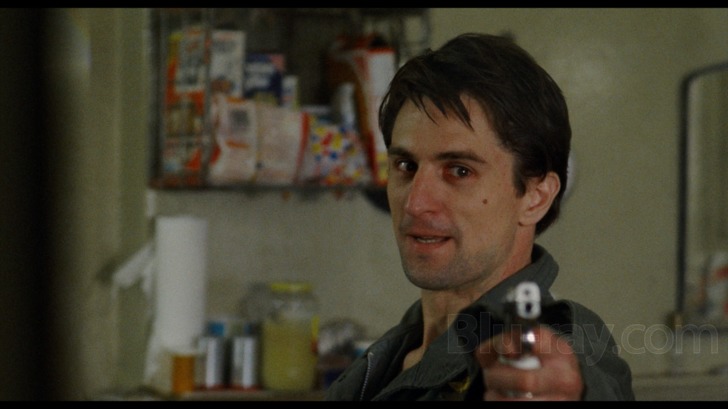
Taxi Driver's DTS-HD MA 5.1 lossless soundtrack appears to be the same from the previous release. While the precision of a brand-new track might be absent, Sony's 5.1 mix captures the very essence of Taxi Driver's varied soundtrack with ease. Besides, clarity and definition are top-shelf as they are; Bernard Herrmann's soundtrack has never enjoyed so much accuracy for home listening as it does here. Every Jazz-like note is smooth and every more mangled, heavy element is as it should be. Spacing is terrific; music plays primarily across the front, enjoying a robust presence and some surround sound support. Ambience is exceptional, too; whether the sounds of the city or the bustle of a campaign office, Taxi Driver delivers an accurate and noticeable but not overwhelming atmosphere that gives body and life to the overall presentation. Gunshots and a few heavier effects play as a bit crunchy and mushy, but better to leave such effects as they were meant to be head rather than give them a phony amped-up 2011 feel. Of course, dialogue is problem-free and center-focused. It probably won't get quite the attention that the video transfer will deservedly earn, but Sony's lossless soundtrack is no less impressive.
Taxi Driver Blu-ray Movie, Special Features and Extras 
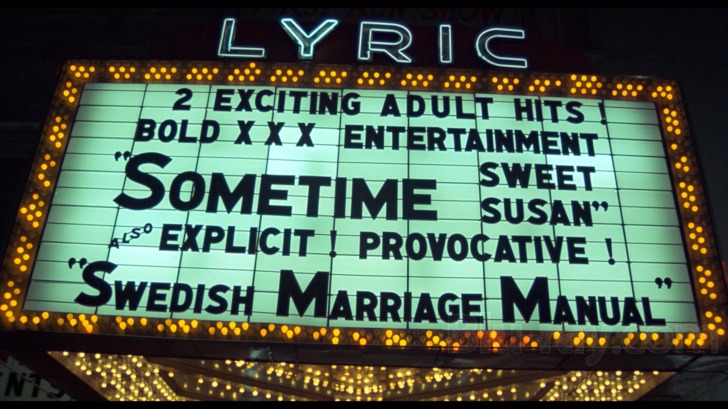
This "Mastered in 4K" Blu-ray release of Taxi Driver contains no supplemental content.
Taxi Driver Blu-ray Movie, Overall Score and Recommendation 
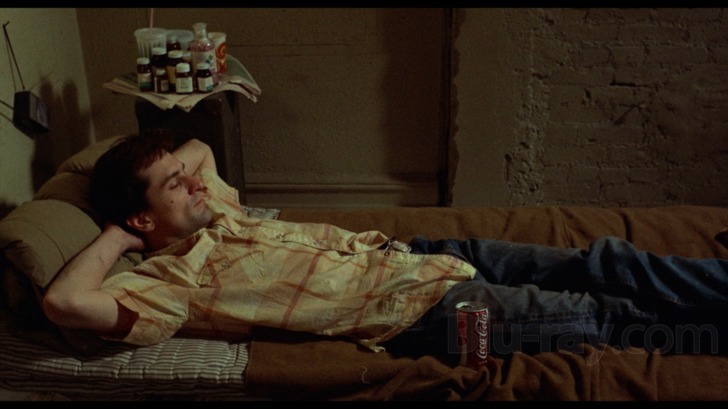
Taxi Driver is an iconic picture that thrives on imbalance, uncertainty, and all sorts of off-kilter elements. A challenging world, uncertain characters, and a general ambiguity that blurs several lines all make Taxi Driver a memorable masterpiece of mood and vagueness. Martin Scorsese's visuals back up the picture's feel, and Robert De Niro delivers the performance of a lifetime by giving shape to a shapeless character without sacrificing the mystery of just who Travis Bickle is and what it is that drives him to act as he does throughout the film. Taxi Driver is one of the all-time great pictures, and Sony has minted a "Mastered in 4K" release that's most certainly the definitive version of the film from a pure videophile's perspective. However, the improvement over the other release is just on the plus side of "negligible," at least when viewed away from Sony's 4K monitors. The absence of supplements keeps this from being the definitive Blu-ray release of Taxi Driver. Recommend only to those who demand the absolute finest picture quality available and who don't mind double-dipping or missing out on some terrific supplements.
Other editions
Taxi Driver: Other Editions

Taxi Driver 4K
1976

Taxi Driver 4K
1976

Taxi Driver
1976

Taxi Driver
40th Anniversary Edition
1976

Taxi Driver
1976

Taxi Driver
40th Anniversary Edition
1976

Taxi Driver
1976
Similar titles
Similar titles you might also like

M
M - Eine Stadt sucht einen Mörder
1931

Child of God
2013

You Were Never Really Here
2017

Blood Ties
2013

Straw Dogs
4K Restoration
1971

A Clockwork Orange 4K
1971

The French Connection
Filmmakers Signature Series | Remastered
1971

Eyes Wide Shut
1999

Prisoners
2013

Klute
1971

The Brave One
2007

Uncut Gems 4K
2019

Gone Girl
2014

Badge 373
1973

The Offence
1973

Marnie 4K
1964

Cape Fear
1991

Seven
Se7en
1995

Mean Streets 4K
1973

The American
2010
